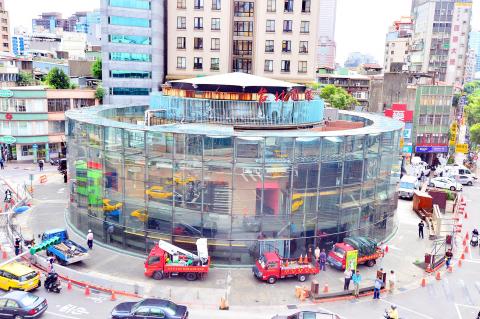The Taipei City Government yesterday started the demolition of Jiancheng Circle (建成圓環) in the Dadaocheng (大稻埕) area.
The Taipei Market Administration Office said that the demolition would cost about NT$2.5 million (US$78,304) and should be completed by February.
The structure is to be converted into a park, with a reservoir below the circle, which has been declared a historical structure, to be preserved, the office said.

Photo: Wang Yi-sung, Taipei Times
Taipei Department of Culture Chief Secretary Liu Te-chien (劉得堅) said that a plan to preserve the reservoir would be submitted next month to the Taipei Cultural Assets Assessment Committee for review.
The Taipei Park and Street Lights Office, which is to oversee work on the park, said the facility has a NT$19 million budget and is scheduled to be completed in July.
“Time rolls on and some things are bound to become memories,” Taipei Mayor Ko Wen-je (柯文哲) said, when asked to comment on the demolition on the sidelines of an event to promote next year’s Summer Universiade.
The structure had been rebuilt from a night market into an indoor food court during former president Ma Ying-jeou’s (馬英九) term as Taipei mayor, which cost NT$200 million, Ko said.
“I am not saying that he had been negligent, but he built something strange, so much so that [the city government] could not figure out how to improve its functionality, and it had become a mausoleum,” he said.
In 1908 the circle was a bustling market and, from the 1950s to early 1990s, a night market, until it fell into disuse after the main building burned down in two separate fires in 1993 and 1999.
In an attempt to modernize the decades-old market, Ma in 2001 ordered the demolition of the food circle and built a two-story cylindrical glass building that opened in October 2003.
However, the modern building did not appeal to food vendors, residents or tourists.
A Taipei resident, surnamed Cheng (鄭,) said he used to frequent the facility with friends when it was a night market, but has not visited in more than 10 years.
Though he feels somewhat nostalgic that the modern structure is being torn down, it is about time that the facility be removed so that the land can be put to better use, Cheng said.

Intelligence agents have recorded 510,000 instances of “controversial information” being spread online by the Chinese Communist Party (CCP) so far this year, the National Security Bureau (NSB) said in a report yesterday, as it warned of artificial intelligence (AI) being employed to generate destabilizing misinformation. The bureau submitted a written report to the Legislative Yuan in preparation for National Security Bureau Director-General Tsai Ming-yen’s (蔡明彥) appearance before the Foreign Affairs and National Defense Committee today. The CCP has been using cognitive warfare to divide Taiwanese society by commenting on controversial issues such as Taiwan Semiconductor Manufacturing Co’s (TSMC, 台積電) investments in the

INVESTIGATION: The case is the latest instance of a DPP figure being implicated in an espionage network accused of allegedly leaking information to Chinese intelligence Democratic Progressive Party (DPP) member Ho Jen-chieh (何仁傑) was detained and held incommunicado yesterday on suspicion of spying for China during his tenure as assistant to then-minister of foreign affairs Joseph Wu (吳釗燮). The Taipei District Prosecutors’ Office said Ho was implicated during its investigation into alleged spying activities by former Presidential Office consultant Wu Shang-yu (吳尚雨). Prosecutors said there is reason to believe Ho breached the National Security Act (國家安全法) by leaking classified Ministry of Foreign Affairs information to Chinese intelligence. Following interrogation, prosecutors petitioned the Taipei District Court to detain Ho, citing concerns over potential collusion or tampering of evidence. The

‘COMPREHENSIVE PLAN’: Lin Chia-lung said that the government was ready to talk about a variety of issues, including investment in and purchases from the US The National Stabilization Fund (NSF) yesterday announced that it would step in to staunch stock market losses for the ninth time in the nation’s history. An NSF board meeting, originally scheduled for Monday next week, was moved to yesterday after stocks plummeted in the wake of US President Donald Trump’s announcement of 32 percent tariffs on Taiwan on Wednesday last week. Board members voted to support the stock market with the NT$500 billion (US$15.15 billion) fund, with injections of funds to begin as soon as today. The NSF in 2000 injected NT$120 billion to stabilize stocks, the most ever. The lowest amount it

NEGOTIATIONS: Taiwan has good relations with Washington and the outlook for the negotiations looks promising, Minister of Economic Affairs J.W. Kuo said Taiwan’s GDP growth this year is expected to decrease by 0.43 to 1.61 percentage points due to the effects of US tariffs, National Development Council (NDC) Minister Paul Liu (劉鏡清) said at a meeting of the legislature’s Economics Committee in Taipei yesterday, citing a preliminary estimate by a private research institution. Taiwan’s economy would be significantly affected by the 32 percent “reciprocal” tariffs slapped by the US, which took effect yesterday, Liu said, adding that GDP growth could fall below 3 percent and potentially even dip below 2 percent to 1.53 percent this year. The council has commissioned another institution